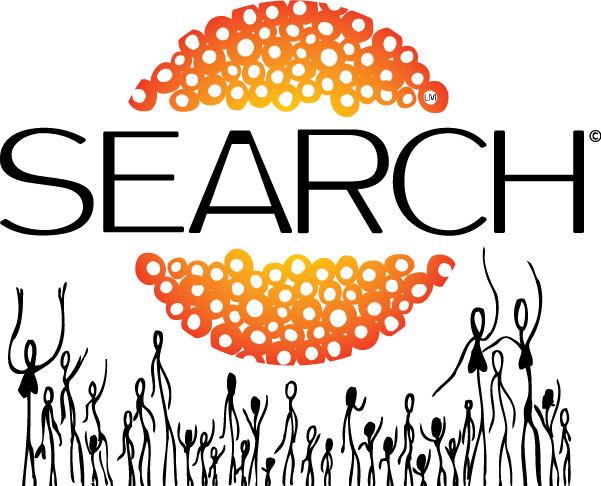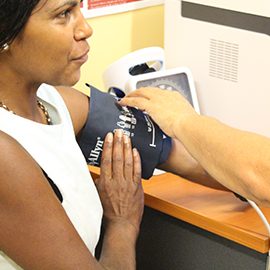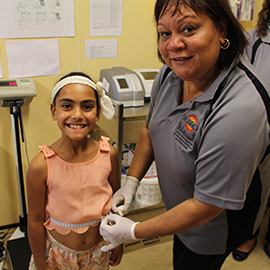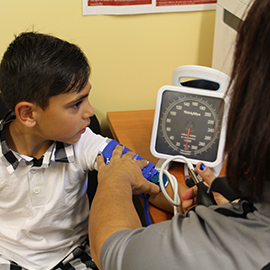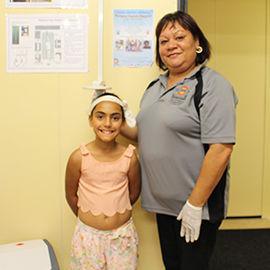While 53% of Aboriginal people live in cities or large regional areas, only 10% of Aboriginal health research focuses on their needs, and so little is known about their health.
SEARCH, a partnership between researchers, the Aboriginal Health and Medical Research Council and four NSW Aboriginal Community Controlled Health Services, has recruited more than 1600 children and their families in order to shift this balance.
It will provide strong research evidence to support governments and medical services in developing the right policies and programs needed to close the gap in health outcomes and life expectancy.
Its aim is to achieve long-term improvements in the health of Aboriginal children. It will do this by finding the causes of health and wellbeing and identifying the best times to provide services and the children most likely to benefit from extra programs.
This will help develop better policies, services and programs, particularly for Aboriginal children living in urban areas.
The value of data and community engagement.
The Study is collecting information on ear infections, speech development, mental health, injury, environmental health, risk factors for later chronic disease, and use of health services.
Its value will increase over time as more data is collected — the children and their families will be followed over a five to 20-year period.
The Aboriginal Community Controlled Health Service partners are:
- Tharawal Aboriginal Corporation
- Aboriginal Medical Service Western Sydney
- Awabakal Newcastle Aboriginal Cooperative Ltd
- Riverina Medical and Dental Aboriginal Corporation
The research leaders are:
- Professor Jonathan Craig (University of Sydney)
- Professor Emily Banks (ANU, Sax Institute).
Aboriginal Medical Services and government and non-government agencies are already using the information collected by SEARCH to understand the health needs of urban Aboriginal children in a wide range of areas from ear health, to access to preschool.
Study Aims and Methods
As a long-term study, SEARCH is designed to recruit children attending Aboriginal Community Controlled Health Services and follow them over time. The measures include both self-report and clinical assessments.
During Phase 1, SEARCH recruited more than 1500 children and collected substantial high-quality information on their health needs. The partnerships between researchers, the AH&MRC and the Aboriginal Community Controlled Health Services have been critical to this phase of the Study.
Formulating research questions, recruiting families and interpreting data have all been undertaken through these partnerships. Written and verbal summaries of the early data have been provided to the Health Services and their input sought.
Key outcomes from Phase 1:
Recruitment of 1530 children and 622 carers into the study
Collection of detailed self-report information about many aspects of health including social and emotional wellbeing, physical health, housing and neighbourhood, injuries, service use and priorities as seen by families. These data are still being analysed but already point to key health needs.
Collection – for the first time – of information about hearing and speech development. SEARCH has tested the hearing of 1486 children and the speech development of 756 children aged one to seven. This work has identified unmet needs among the children and contributed to additional funds for services.
Development of better research tools for use in Aboriginal health. Too often, tools developed for use in non-Aboriginal people are used without understanding their appropriateness for Aboriginal communities. This is early work and several papers have already been published.
Find out more
View the full list of publications: SEARCH publications
Download the SEARCH Study Protocol (PDF 493KB) for more detail on the methods used in phase 1
SEARCH Phase 2
SEARCH is now in its second phase of development. This phase represents significant new directions for this collaborative Study. Core work during Phase 2 will be following up the children and families participating in the Study, and the development and evaluation of a program to use SEARCH data to drive change. There will be partnership work to ensure the information that has been collected is used appropriately and to advocate for new services.

